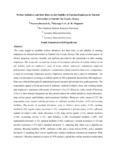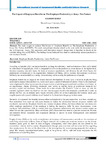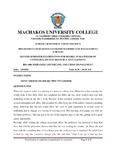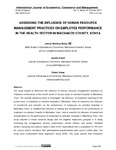| dc.description.abstract | The study sought to establish welfare initiatives and their roles on job stability of catering
employees in selected universities in Nairobi City County, Kenya. The study covered aspects of
efforts, programs, services, benefits and facilities provided by the universities to their catering
employees. The study also covered the aspects of concerned with roles of welfare initiatives on
job stability such as; employee’s sense of being valued, employees’ attachment, improved
performance, fringe benefits, employees’ commitment, talents retention, hard work, competency,
a sense of ownership, employees loyalty, employees satisfaction and a sense of fulfillment. The
study was descriptive covering a stratified sample of 189 respondents drawn from 300 employees.
Data was collected through self-administered questionnaires and an interview guide questions. The
respondents agreed with the provision of uniforms, medical facilities, clean safe working station
and employee’s assistance with means of between 1.5 to 2.5. However, with a mean of between
3.5 to 4.5, they strongly disagreed that, they are provided with welfare initiatives; meals allowance,
long service grants, paid holidays and recreational facilities. Moreover, with a mean of 2.57, the
respondents were neutral with the provision of; sufficient number of toilets (2.57) and housing
facilities. The results of standard deviations were as follows; leave policy (1.53), sporting
facilities(1.24), regular salary increment (1.37), comprehensive pension policy (1.35), sufficient
number of toilets (1.08), meals allowance (1.25), long service grants (1.15), canteen facilities
(1.04), counseling service (1.12), paid holidays (1.30), recreational facilities (1.09), well
maintained restrooms (1.13), medical facilities (1.02), employee’s funeral assistance (1.32) and
transfer assistance (1.37) had a standard deviation >1, implying that, there was a significance
variance. Housing facilities (0.99), uniforms (1.00) and a clean station (0.94), had a standard
deviation <1, meaning, there was no significance variance and hence consensus in responses. With
a mean of 1.86 and a standard deviation of .979, majority agreed that welfare initiatives make them feel valued by their universities. 86.2% agreed that, being valued makes them more attached to
their universities. A mean of 1.84 and a standard deviation of .839 revealed that, welfare inspires
employees to work hard and better. It is evidenced with a mean of 1.82 and a standard deviation
of .921 that, fringe benefits enhances employee’s commitment. A mean of 2.50 and a standard
deviation of 1.483 revealed a concurrence that, welfare initiatives attracts and retains talents of
university catering departments. A majority of respondents 42.8% were of the opinion that, welfare
initiatives inspires hard work and competency among the university catering employees. A mean
of 2.39 and a standard deviation of 1.557, the respondents opined that, welfare initiatives enhance
their satisfaction levels. Moreover, with a mean of 1.39 and a standard deviation of .769, the
respondents were of the view that, welfare initiatives allows them to take pride in their
organizational membership. A majority of the respondents (86.8%) held that, welfare initiatives
allow employees loyalty. It is evidenced with a mean of 1.93 and a standard deviation of .716 that,
welfare initiatives enables employees to work with passion and fulfillment. The findings
demonstrated with a mean of 1.81 and a standard deviation of 0.820 that, welfare initiatives enables
employees to continue working with their organizations | en_US |




